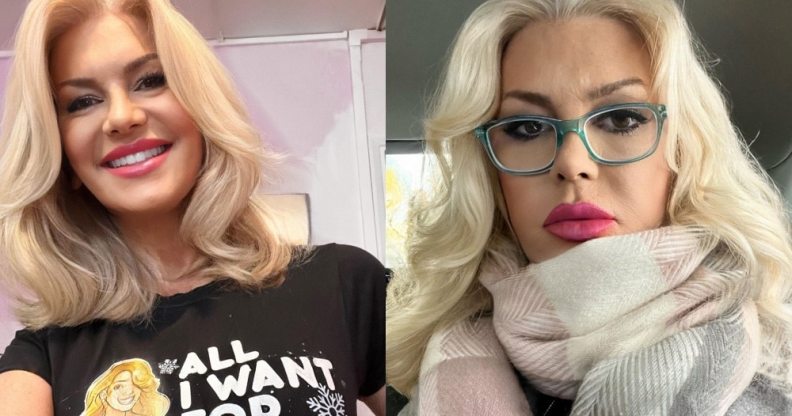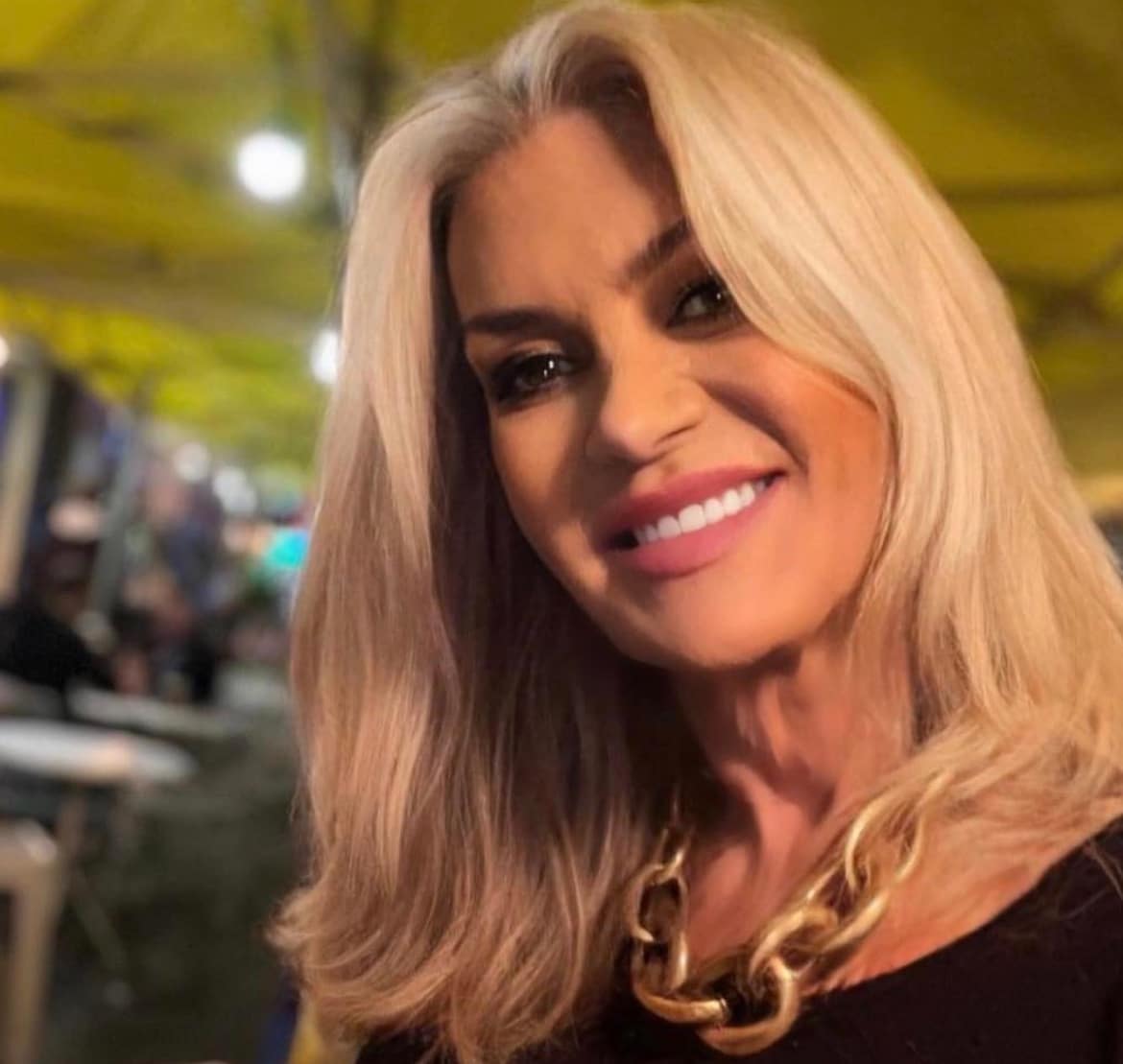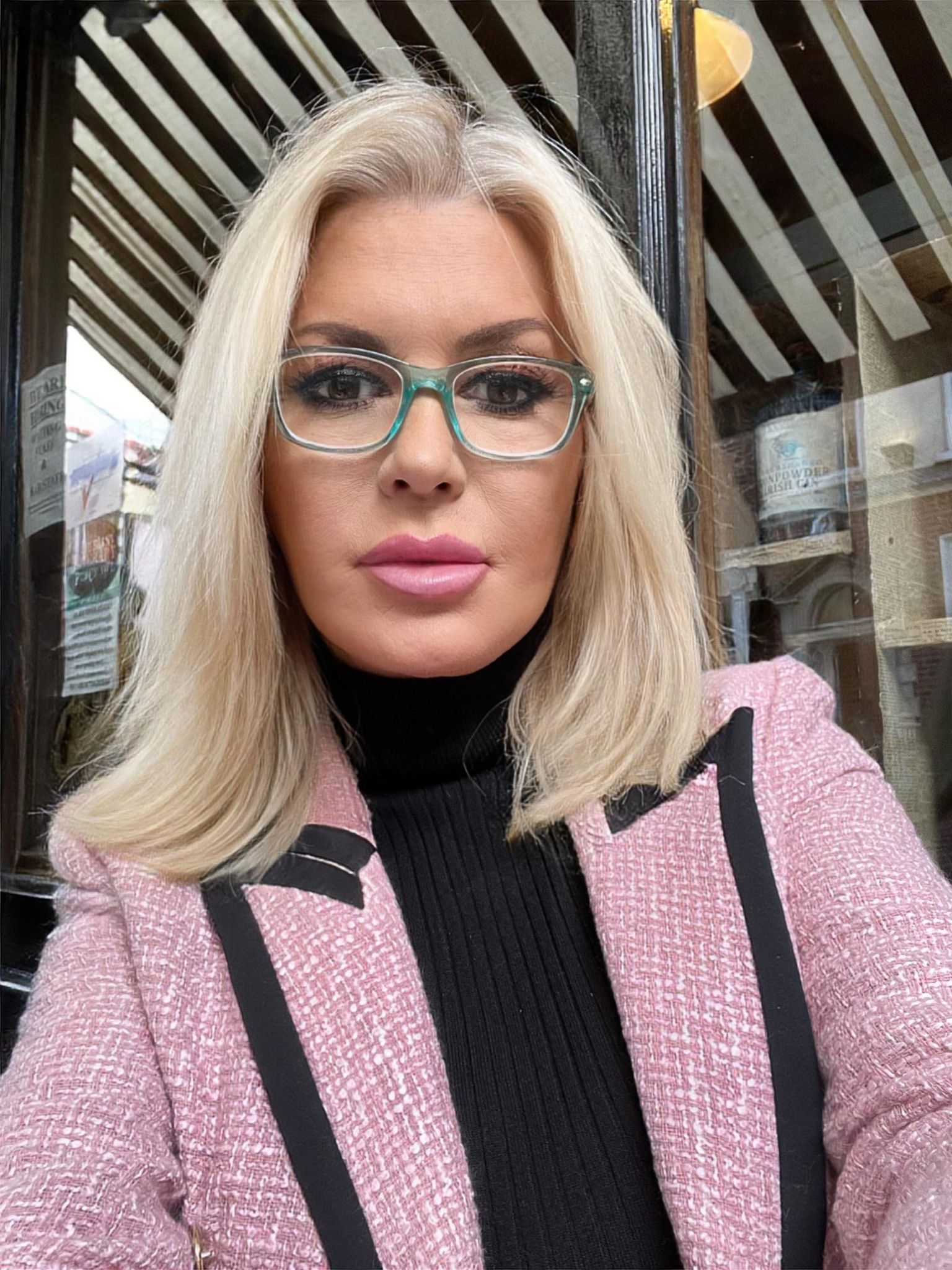Trans woman with HIV was told she only had two years to live. 30 years later, she’s thriving

Rebecca Tallon de Havilland wearing a U=U t-shirt. (Provided)
To mark World AIDS Day, we spoke to Rebecca Tallon de Havilland, a trailblazing trans woman who is living with HIV.
When Rebecca Tallon de Havilland was in her late 20s, she went into hospital to have gender affirmation surgery.
The year was 1987. It was a monumental day for Rebecca – but her life was immediately thrown into disarray when a routine test revealed that she had HIV.
“I’d heard of AIDS, but I genuinely thought someone like me couldn’t get that,” Rebecca tells PinkNews. “I’m from Ranelagh [Dublin, Ireland], I come from a good family, and I wasn’t into anything risqué. I probably thought, as a lot of people would have thought then, ignorantly, that it came from Africa, or if you were gay you had to be into really rough sex or whatever. So a little blonde thing like me couldn’t catch something like that.
“When I was told I had it, and that I had two years to live – oh my God, my whole world just fell apart. It just stopped. And to this day, I’ve still never gotten that back. I was in my 20s – I’m now 63. My world changed, and it ended in many ways.”
More than 30 years on, Rebecca is now living her best life – she is in good health and is happy. She lives in London, where she dedicates her time to raising awareness of the fact that HIV doesn’t only affect gay and bisexual men – it also affects women.
Being diagnosed with HIV in the 1980s when the virus was still a death sentence meant Rebecca acquired an additional layer of oppression. She was already a trans woman living in an unaccepting society – having HIV pushed her even further to the margins of society.
I support Prep awareness week because this is such a valuable tablet to take to prevent you getting HIV #GetOnPrep https://t.co/NHpP0mCPSO @56TSoho pic.twitter.com/ugAjF8cEI7
— 𝑹𝑬𝑩𝑬𝑪𝑪𝑨 𝒅𝒆 𝑯𝑨𝑽𝑰𝑳𝑳𝑨𝑵𝑫 (@BexDeHavilland) November 27, 2021
While Rebecca thought she had just two years to live, she decided to push ahead with her gender affirmation surgeries. She said it would have been “the great tragedy” of her life if she had died before she could more closely resemble the person she really was.
“People often say, ‘How did you survive?’ And I just think that I wanted to be Rebecca so much. It was more important to me than anything else,” she says.
Rebecca Tallon de Havilland was ‘cut off from everything’ when she was diagnosed with HIV
Rebecca had to contend with discriminatory attitudes after she told her loved ones she had been diagnosed with HIV – hugs became less frequent, and when she visited people’s homes, she was given the same cup each time as part of a warped, unscientific approach to infection control.
Being a trans woman and living with HIV meant that Rebecca was denied access to many of the milestones of adult life. She was supposed to move to New York to work as a hair and make-up artist, but a policy prohibiting HIV-positive people from moving to the United States meant she was denied the opportunity. That rule was only changed in 2010.
She is also still renting today and has never had a mortgage – for a long time, banks wouldn’t lend to people with HIV (and often to gay men across the board) because they assumed they wouldn’t live long enough to pay it off.
“Those are the things that need to be highlighted,” Rebecca says. “In my 20s, in the height of my career, I was cut off from everything. I kind of had a double whammy being trans and HIV.”
Because she faced so much discrimination as a trans woman with HIV, Rebecca fell silent. She didn’t talk about her status for most of her adult life. That has only changed in the last five or six years.
“For 29 years I was silent,” she says. “I was getting to the stage where I was in my 50s and I thought: ‘Is this it for me? Is this my lot?’ There was a lot of people who wouldn’t even have remembered how well known in Ireland I was for the work I did. I felt talentless. I felt I was too old to do anything.”
It was around that time that Rebecca found out about a programme run by the Terrence Higgins Trust called Positive Voices, where people with HIV go into schools to talk to students about their status. She went along and shadowed a woman called Susan.
“I went along to shadow one of these talks and I heard this woman called Susan speak, and for the first time in my life, I would have given anything to be able to speak like that and to be that honest,” Rebecca says. “I came away, I rang my daughter because she didn’t really know… She told me she loved me, and that when I walk into a room I light it up. She said, ‘Go do it.’ For the first time in my life, the most important person in my life, my daughter, was OK with it. Everybody else kind of faded into the background.”
For the first time in my life, I had no skeletons left in the closet.
Rebecca still remembers how nervous she was when she gave her first talk to teenagers in London – but the students were empathetic and keen to hear about her experience. Some expressed shock when they found out she was a grandmother, while one teenage girl approached Rebecca to tell her she loved her shoes.
“I just felt for the first time in my life that I had been as honest and as transparent as glass. When I left there, I was walking on air – to me, it was the best drug I’d ever taken. And then it grew from there and before I knew it I was talking on big platforms in places like Amsterdam. People would say to me, ‘How did you do it?’ And I’d say, I just told the truth for the first time in my life. I didn’t need a script, I just said it as it was.”
That experience “changed everything” for Rebecca. “For the first time in my life, I had no skeletons left in the closet. Nobody’s going to shut me up anymore.”
Women are also affected by the virus – but many don’t realise they can catch it
Rebecca’s work is not yet done. Since she gave that first talk to secondary school students, she has worked tirelessly to raise awareness of the facts around HIV. She wants people to know that people with HIV who are on effective treatment have an undetectable viral load, meaning they can’t pass it on. This is referred to as U=U – undetectable equals untransmittable.
But she also wants people to know that HIV does not just affect gay and bisexual men. Women accounted for 28 per cent of new HIV cases in 2019 in the UK.
“HIV is the one thing in this world that doesn’t discriminate,” Rebecca says. “If you catch it, you catch it. It has no age limit, nothing. I would come across an awful lot of girls and they actually think it can’t hit them. So much is done for World AIDS Day and it’s all about gay men – which I think is really unfair on the gay population too, because it makes everybody think you have to be gay, or it’s a gay plague.”
Rebecca says many of the women contracting HIV are those in middle age who might be menopausal, or those who might have gone through a divorce and are dating again for the first time in a long time.
This is the face of HIV today – a good face, looking good, feeling good.
“They’re out on the pull again, and I’m telling you, us older chicks – younger guys come on to us quite a lot. Maybe because we’ve got experience and maybe because we’re not looking for babies – I don’t know. A lot of women think, ‘Oh well I don’t have to take the pill anymore because I’m past that,’ but they never once think they can catch HIV purely because that airplane went over their heads back in the 80s and 90s because we were all calling it the gay plague. So you try and tell a mother with 2.5 children living in the suburbs that she can catch HIV – it doesn’t even register.”
Women are much less likely to take PrEP (pre-exposure prophylaxis) than queer men, Rebecca points out.
“Women are used to taking a tablet once a day, probably from the age of 18. They would easily take PrEP. We need to educate them.”
She adds: “This is the face of HIV today – a good face, looking good, feeling good. I’m empowered because I know my status, I know I’m undetectable. There are women out there around my age who are dating not even knowing – the amount that don’t even know they have it. We need people to get tested and to own their own bodies.”



